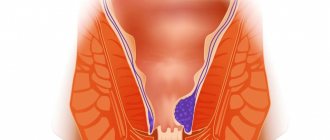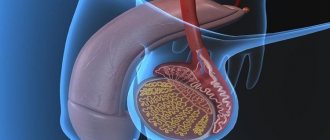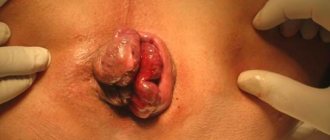The problem of hemorrhoids has been repeatedly touched upon in medical articles. For interested readers, the main and secondary causes and symptoms of this disease, as well as the treatment methods used, both conservative and surgical, were listed in detail.
At the same time, although general information is also important for understanding the nature of the disease under discussion and the approaches to its clinical therapy, patients often want answers from the proctologist to more specific questions regarding the recommended lifestyle, the advisability of following a diet, prognosis for cure, etc. In order not to Leaving aside nothing that may concern patients suffering from this delicate ailment, detailed answers to the eight most frequently asked questions about anal hemorrhoids will be given below.
Is it true that hemorrhoids are a lifelong diagnosis?
No it is not true. Hemorrhoids are indeed regarded by medicine as a recurrent disease, but this statement also has its own nuances.
In particular, sometimes the expansion of hemorrhoidal veins is caused not by external factors (weight lifting), but by internal problems with the venous system. Weakness and thinning of veins throughout the body can lead to a number of diseases, the list of which includes hemorrhoids. Completing a full course of vascular therapy will help solve this problem.
List of effective drugs
Common remedies for hemorrhoids are divided according to their effect in suppressing symptoms, active ingredients and cost. The list of popular medications is presented:
Relief
Medicine with anti-inflammatory, vasoconstrictive and regenerative spectrum of action. By reducing the lumen of blood vessels, the burning sensation and itching are reduced, and tissue restoration begins. The ointment stops bleeding and reduces the level of inflammation. The medicine is recommended for use for fissures in the anal area.
The drug is prohibited:
- patients under 12 years of age;
- with thromboembolism;
- granulocytopenia;
- increased sensitivity.
Particular caution is needed when used by patients with diabetes mellitus, prostate hypertrophy, hyperthyroidism, a history of hypertension, during pregnancy or breastfeeding.
Bezornilom
The medicine has an analgesic effect and can be used to prevent the development of swelling and inflammation. The composition of the drug is presented:
- borneol;
- pearls;
- amber;
- musk; zinc compounds.
The medication is prescribed to patients with hemorrhoids, anal wounds after surgery, fissures and eczema of the anus. It is considered an effective remedy with an improvement in the general condition of the patient on the second day from the start of therapy.
The drug is not prescribed for individual intolerance to individual components.
Proctosan
A non-hormonal agent with the effect of suppressing inflammation and the active component bufexamac. The vismus contained in the composition stops local bleeding and has an astringent effect, and titanium accelerates the regeneration of cracked tissues.
Lidocaine relieves pain, burning and itching. The drug is not recommended for children, pregnant and lactating women, patients with syphilis, pelvic tuberculosis.
Heparin ointment
Each of the components of the drug has an individual spectrum of action:
- antithrombic effect with a decrease in the inflammatory process - with heparin;
- anesthetic - benzocaine;
- vasodilator - benzyl nicotinate.
The medication is prohibited for use in cases of skin necrosis and damage, a tendency to spontaneous bleeding, and decreased blood clotting.
Troxevasin
The medicine reduces capillary fragility, has an anti-edematous and anti-inflammatory effect. The ointment accelerates regeneration processes at the cellular level. Hypoallergenic, does not provoke pronounced adverse reactions to the component composition. The drug is contraindicated in people with a tendency to bleeding, with a reduced rate of blood clotting and damage to the skin.
What is the most effective method of surgical treatment of hemorrhoids?
This is the wrong way to pose the question because at different stages of the disease different methods of radical therapy are used.
In particular, sclerotherapy is most effective for primary hemorrhoids that are detected in the early stages. Laser vaporization is more applicable for chronic, unadvanced forms of the disease. And the removal of hemorrhoids through hemorrhoidectomy, including the radio wave method using the Surgitron apparatus, is indicated for external prolapse of the nodes in the later stages.
Urologist-andrologist, urologist of the highest category Nizamutdinov Vadim Munirovich
A case from the practice of a proctologist
Now let's consider this situation. I wrote about her in my telegram channel “Doctor-heals”.
During the first pregnancy and after childbirth there were thromboses of nodes, veins, and blood. Well, everything is as it should be during an exacerbation of hemorrhoidal disease. Then everything went away. There are small folds left near the anus, which do not hurt, but only spoil the beauty. I’ll tell you a secret - THIS IS HEMORRHOIDS!, my dears.
And now you are planning your second pregnancy. Here we have the development of two very common options for further events:
- The first option is not at all smart: I closed my eyes and “drove through the intersection for luck, according to the principle “maybe I’ll get through”... This doesn’t happen often. The logic of the reasoning is simple: “Since hemorrhoids don’t bother you now, they won’t bother you during your SECOND pregnancy either.” Yeah! Blessed are the ignorant... Why, if hemorrhoids were inflamed during the FIRST pregnancy, then during the SECOND pregnancy they will not become inflamed. Maybe 1-2 out of 100 won’t, but that’s with my mother’s prayers... For the rest, it will be whatever it is. Don't say you didn't know. We didn’t think so – yes, I believe it. Now you know, I thought for you and told you.
- The second option is smarter, but the life principle: “trust, but verify” has not been canceled. As a conscientious patient, I went to the proctologist, and he said that there is no need to do anything now, anyway, after childbirth it will be larger, then we will operate. Re-read the first version of the story, well, you will get pregnant and what will happen next. Have you reread it? Now you know. In general, with this topic, “as for childbirth... it’s not necessary, anyway...” Dear, my dear readers, think about this phrase! She is very ambiguous! Let's look at similar situations. There is no need to treat your teeth either; they will fall out on their own (or they will pull them out if they hurt too much). There is no need to remove a polyp or mole either; when there is cancer, then we will operate. There is also no need to operate on appendicitis, but if there is already peritonitis... There is no need to undergo treatment in general either, everyone dies in the end anyway.
Of course, if we consider the issue of hemorrhoids in a woman who wants to get pregnant from the perspective of a proctologist 20-30 years ago, then yes, one operation is better than two. “And when there are larger hemorrhoids, we will cut them off, sew everything up, and if you don’t get pregnant, there is a high chance that you will no longer have hemorrhoids.”
But times are changing!
Now a proctologist can use a laser to remove 1-2 veins the size of a buckwheat grain, if necessary, not to mention the internal nodes, and live in peace. Have children, raise them to your joy.
You treat your teeth before pregnancy, knowing that during pregnancy they are more destroyed. Otherwise you will be left with stumps in your mouth. And after childbirth, they have to be treated repeatedly throughout their lives. And teeth are basically a bone structure, it is more stable than veins - soft tissue.
Stages of the disease
There are four main stages of hemorrhoids, each with its own characteristics:
- In the first stage, patients notice only bleeding. The nodes do not fall out, there is no acute pain.
- In the second stage, hemorrhoids begin to fall out. After some time they straighten on their own. The prolapse may be accompanied by bleeding, but not necessarily.
- Hemorrhoids fall out with a certain frequency; they can only be set manually.
- The fourth stage is considered the final stage. Characterized by almost constant loss of nodes.
There are separate acute and chronic hemorrhoids. Acute is characterized by the rapid development of the disease, the sudden onset of several symptoms at once.
Diagnosis of hemorrhoids
stages of hemorrhoids
Despite the fact that modern equipment makes it possible to quickly and easily diagnose hemorrhoids, the doctor usually prescribes a number of examinations and tests to select the right therapy. Thus, the treatment of external and internal hemorrhoids differs; the choice of tactics depends on the presence of chronic diseases in the patient and the stage of the disease.
Treatment of typical complaints begins with an examination by a proctologist. Based on external signs, you can determine the stage of the disease and prescribe additional examinations. The doctor evaluates the possibility of repositioning the nodes, the presence or absence of anal fissures, finds out the degree of bleeding and the degree of pain. The use of modern diagnostic tools allows us to estimate the size of hemorrhoids.
Correct assessment of the stage of the disease is important when selecting therapy. Before surgery for hemorrhoids, it is necessary to conduct an examination of the colon, which includes anoscopy, sigmoidoscopy, and colonoscopy. Studies must be performed to exclude neoplasms and other diseases of the colon.
The best veinotonics for hemorrhoids
Les Laboratoires Servier "Detralex" - a multifunctional venotonic for acute and chronic hemorrhoids
5.0
★★★★★
editorial assessment
100%
buyers recommend this product
Tablets with a venotonic effect are intended for the treatment of varicose veins and hemorrhoids. The product contains flavonoids, hesperidin and diosmin. The product strengthens the walls of blood vessels, increases the elasticity of veins and prevents blood stagnation.
For acute hemorrhoids, the drug is taken 6 tablets per day for 4 days, then the dosage is reduced to 4 tablets. In the chronic form of the disease, the dosage of Detralex is 2 tablets per day for up to several months.
The product is contraindicated in case of lactation and individual intolerance to the components of the formula, and its long-term use can cause general weakness, nausea, diarrhea and skin rashes. Detralex does not have a teratogenic effect, therefore it is recommended for hemorrhoids and pregnant women.
Advantages:
- Versatility;
- Effective for acute and chronic hemorrhoids;
- Can be taken by pregnant women;
- Long-term use is possible;
- General positive effect on blood vessels and veins;
- Available in various dosages (500 and 1000 mg).
Flaws:
- Contraindicated during lactation;
- High cost - about 2500 rubles for 60 tablets.
Detralex is prescribed for the treatment of hemorrhoids caused by disorders of the venous and vascular systems.
Laboratories Innothera "Phlebodia" - treatment of varicose veins of the rectum
5.0
★★★★★
editorial assessment
100%
buyers recommend this product
The drug contains 600 mg of diosmin, due to which it has an intense venotonic, anti-inflammatory and lymphatic drainage effect.
The drug in tablet form is prescribed to adults for the treatment of varicose veins and hemorrhoids, 1-3 tablets per day. The duration of therapy is individual.
Long-term and excessive use of capsules provokes diarrhea, heartburn, constipation, headaches and hives.
Phlebodia is contraindicated for persons under 18 years of age, in the first trimester of pregnancy and during breastfeeding. For the treatment of acute hemorrhoids, Phlebodia is used in combination with hemostatic agents, anticoagulants and astringents.
Advantages:
- Pronounced venotonic effect;
- Strengthens the walls of veins and blood vessels;
- Can be used in the II and III trimesters of pregnancy;
- Minimum contraindications;
- Suitable for long-term use.
Flaws:
- Contraindicated for minors;
- High price - 1800 rubles for 60 tablets.
Phlebodia is an effective venotonic agent, especially recommended in the treatment of thrombosis of hemorrhoids.
READ ALSO
12 Best Nootropics
Hemostatic suppositories and tips on the correct use of suppositories
Potato suppositories are effective for hemorrhoids.
Traditional methods of treating hemorrhoids are a quite popular and relevant topic, since some people are embarrassed to admit to this disease. Often patients keep silent about the fact of hemorrhoids and carry out treatment on their own. It is important to remember: traditional medicine is an unreliable method of therapy; they do not fight the cause of the disease, but only reduce the symptoms. Simply put, recovery using only alternative methods is possible only in some cases, but no one denies their effectiveness when used in an integrated approach along with standard treatment prescribed by a qualified specialist. Potato-based suppositories to stop bleeding are considered very popular and easy to prepare. A suppository of the same shape as a suppository sold in a pharmacy is cut out of a clean, peeled potato, after which vegetable oil is applied to it and before going to bed, it is inserted into the anus, leaving it there all night.
The remains of such a suppository will come out in the morning without outside help during bowel movements. Before using such a suppository, you must first cleanse the intestines and wash the perianal folds thoroughly. Using honey and propolis, you can make extremely effective suppositories for the treatment of hemorrhoids with bleeding; there are even ready-made medicines based on these components on pharmacy shelves. To make them yourself, you should use candied honey, diluting it with propolis to a viscous consistency. Then you need to form a candle from this mass, and for greater convenience, you can freeze it a little. Before inserting suppositories made in this way, it is necessary to treat the perianal folds with vegetable oil, for example, sea buckthorn.
Correct use of suppositories for bleeding hemorrhoids
Rectal suppositories are often prescribed for treatment.
Suppositories are a type of medicine that is administered rectally: for them to be effective, the drug must be in direct contact with the surface of the rectum. Before using this type of medication, you need to empty your large intestine (to do this, you can simply go to the toilet, or use a cleansing enema). After this, you should clean the perianal area by washing it with warm water and soap. In case of bleeding, you need to use a paper towel to blot it. Typically, suppositories for the treatment of hemorrhoids are administered before bedtime, since at night the absorption of the active components of the drug, as well as the body’s recovery processes, occur faster, and this contributes to more effective treatment of the disease. The suppository must be cleared of the cellophane coating and inserted into the anus as quickly as possible, since the suppository quickly melts in the hands.
Alternative methods of combating hemorrhoids with bleeding are ineffective if you use only them for treatment, without resorting to the services of conventional medicine. When they are used in combination with standard methods prescribed by a qualified proctologist, then traditional methods can speed up the healing process. The instructions for administering suppositories are simple: you need to cleanse the large intestine, rinse the perianal area and insert a suppository into the anus before going to bed. Hemorrhoids are a serious disease and although it is awkward to seek help, you should not refuse to consult a doctor. Bleeding is one of the main symptoms of this disease, causing concern for the patient. A variety of methods can be used to stop bleeding, but it will be most effective to undergo treatment under the supervision of a qualified proctologist: only he can select the most suitable drugs and prescribe their correct use.
Symptoms of the disease and causes of its occurrence
Hemorrhoids can be both internal and external.
Bleeding is the main symptom of hemorrhoids. In the first stages of the disease or in cases where it is not marked by special complications, patients may notice only small traces of blood on hygiene items or bloody streaks in the stool. As the pathology develops, a person begins to deal with increasingly severe hemorrhages during bowel movements. Often bleeding has the following characteristics:
- the bright red color of the secreted blood, and the process itself does not cause discomfort or pain, so it may be quite unexpected for the patient
- going to the toilet is constantly accompanied by bleeding
- The discharge of blood can be quite strong. In such cases, the patient may have the appearance of a stream and this negatively affects the person’s condition in general: fatigue, weakness, and dizziness occur.
- bleeding may be small and appear only with constipation or dietary irregularities
Cases in which bleeding often occurs:
- constipation (hard feces damage the nodes, resulting in the appearance of blood)
- chronic hemorrhoids, which are accompanied by a large size and number of hemorrhoids
- pushing during childbirth
- diarrhea










